COP28 Takeaways from Northwestern’s Delegation

Faculty and graduate students from Northwestern’s delegation to COP28 reflect on the challenges and promise of global climate action.
For a third year, Northwestern sent a delegation of 12 faculty and graduate students to the United Nations Framework Convention on Climate Change 28th Conference of Parties (COP28), the world’s largest annual international climate summit. Hosted in Expo City, Dubai in the United Arab Emirates, COP28 drew over 80,000 policymakers, researchers, industry leaders and more across two weeks in November and December 2023, during which world leaders from nearly 200 countries convened to negotiate and agree on coordinated action to tackle climate change.
At COP28, Northwestern's delegates observed negotiations, shared their thought leadership in panel discussions and research presentations, attended events hosted by preeminent climate leaders and expanded their global networks. The delegation was supported by the Northwestern Roberta Buffett Institute for Global Affairs. Samantha Nissen, Northwestern Buffett's Associate Director for Strategic Initiatives, led pre-departure trainings for the delegation and supported delegates in navigating the conference. The Paula M. Trienens Institute for Sustainability and Energy at Northwestern offset the environmental footprint of Northwestern delegates’ travel through the purchase of carbon offsets, which invest in projects that reduce climate emissions elsewhere.
Representing five Northwestern schools, the delegates engaged with climate negotiations and discussions at COP28 through a range of disciplinary lenses. Northwestern Buffett spoke with five delegates about their reflections on the challenges and promise of global climate action.
Kimberly Marion Suiseeya
Associate Professor of Political Science, Weinberg College of Arts and Sciences; Faculty Fellow, Northwestern Buffett Institute for Global Affairs
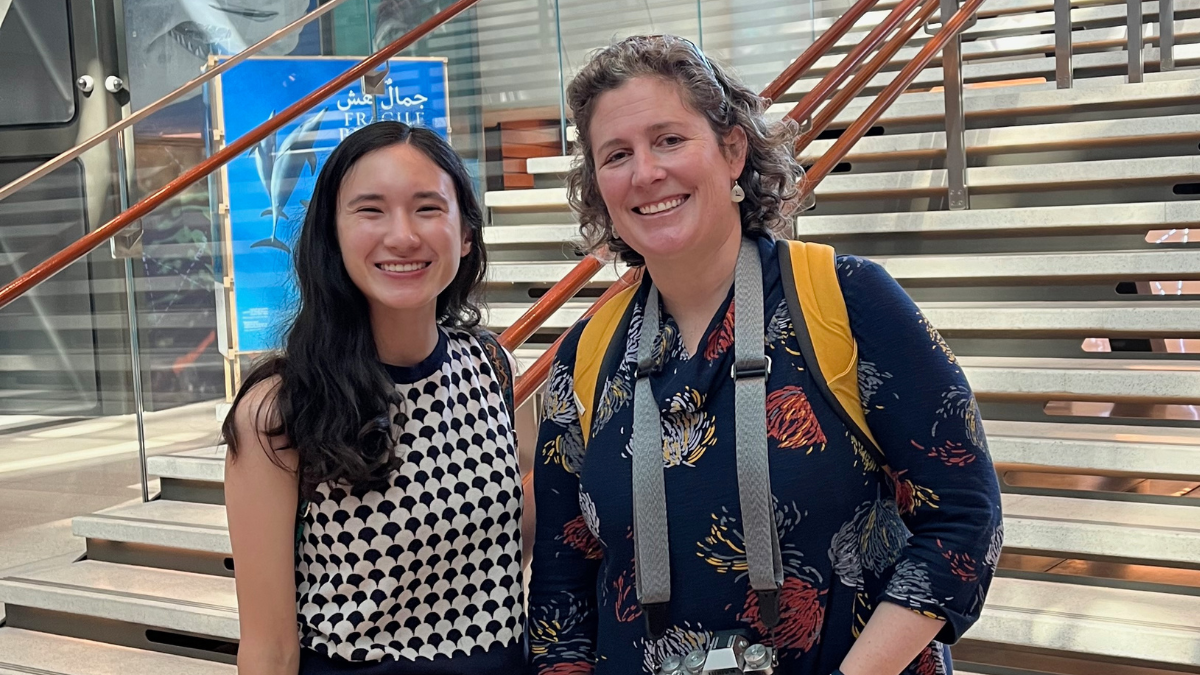
At COP28, Professor Suiseeya (right) encountered Northwestern alumna Michelle David (left; Department of Political Science, Weinberg College of Arts and Sciences, ’18), who was a member of her Presence 2 Influence project that aimed to examine the ways in which marginalized and underrepresented groups effectively influence global environmental governance.
“The UNFCCC is a global institution designed to address a wicked problem. It's trying to figure out how we bridge the gap between the kinds of global decisions that are necessary for systems change. But there also needs to be local decisions that can help us implement systems change. Currently, we’re relying on nation states to fill both those roles. We need community experts, students, elders and youth, who are much better attuned to the real dynamics on the ground...there's a lot of hope if we think about things through a justice lens than if we think about things through an emissions lens,” said Professor Kimberly Marion Suiseeya, who led the delegation, at the COP28 side event “Decarbonization Ecosystems: The Impact of University Partnerships” organized by the U7+ Alliance of World Universities.
“I think that the more we can create space for all these diverse ways of knowing, we can start to get out of the tracked thinking we've gotten into on all these problems...as a settler scientist, it's not my role to do Indigenous science or Indigenous knowledge. I like to stand behind it and support it, amplifying it in the ways that I can,” she said. Professor Suiseeya co-leads the Disproportionate Impacts of Environmental Challenges Global Working Group at Northwestern Buffett and co-authored a 2022 paper with members of the Ojibwe tribes in the western Great Lakes region that demonstrated how the lack of recognition of traditional knowledge within climate science constrains effective climate action and exacerbates climate injustice.
Stella Fors
PhD Candidate, Department of Chemistry, Weinberg College of Arts and Sciences
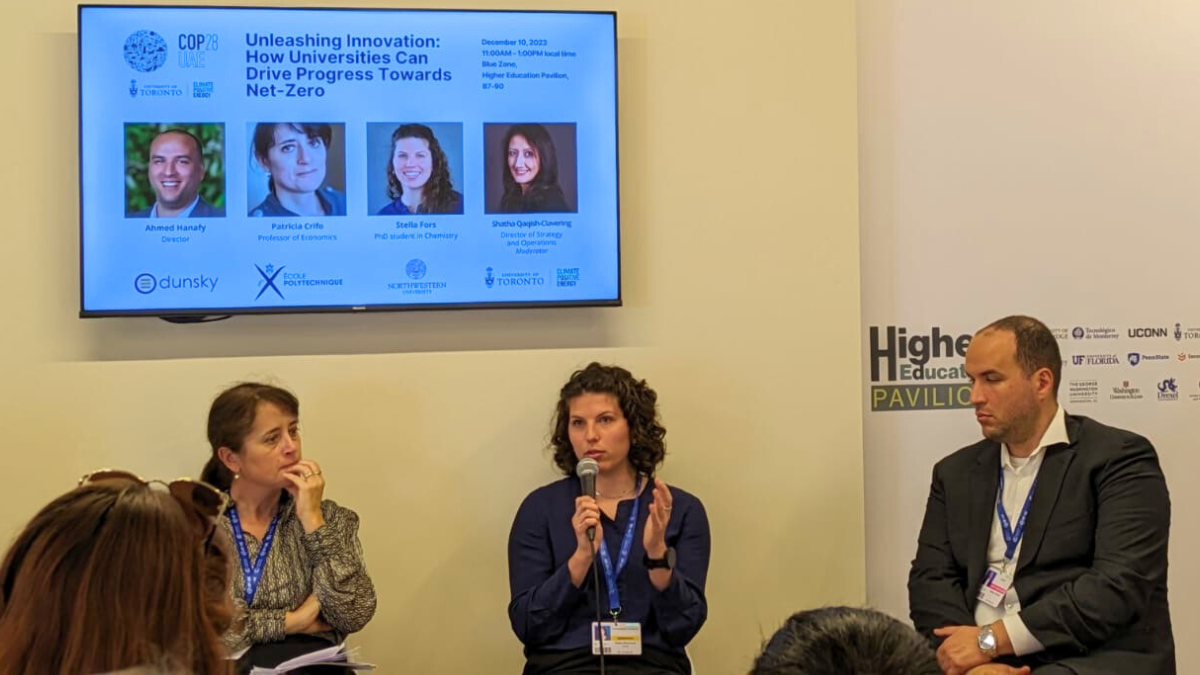
Stella Fors (center) spoke at the panel discussion “Unleashing Innovation: How Universities Can Drive Progress Towards Net-Zero" hosted by the University of Toronto in the Higher Education Pavilion at COP28.
“There are two different languages being spoken at COP. One is the language of science about emissions or technologies, for example, and then there is the language of developing countries, at-risk communities and Indigenous groups...the language they're using to advocate for change invokes their right to their life and their right to a safe community,” said Fors. While at COP28, she served as a panelist in a discussion focused on innovation and the role of universities in meeting the needs of communities and industry to achieve net-zero 2050 targets.
“I realized that the only thing that will save us are people and their actions at the local level as well as solidarity between groups...it highlighted that the advocacy I'm already involved in is important and worth the time. I think in my career, I want to continue some kind of advocacy element within it.”
Sera Young
Associate Professor of Anthropology, Weinberg College of Arts and Sciences
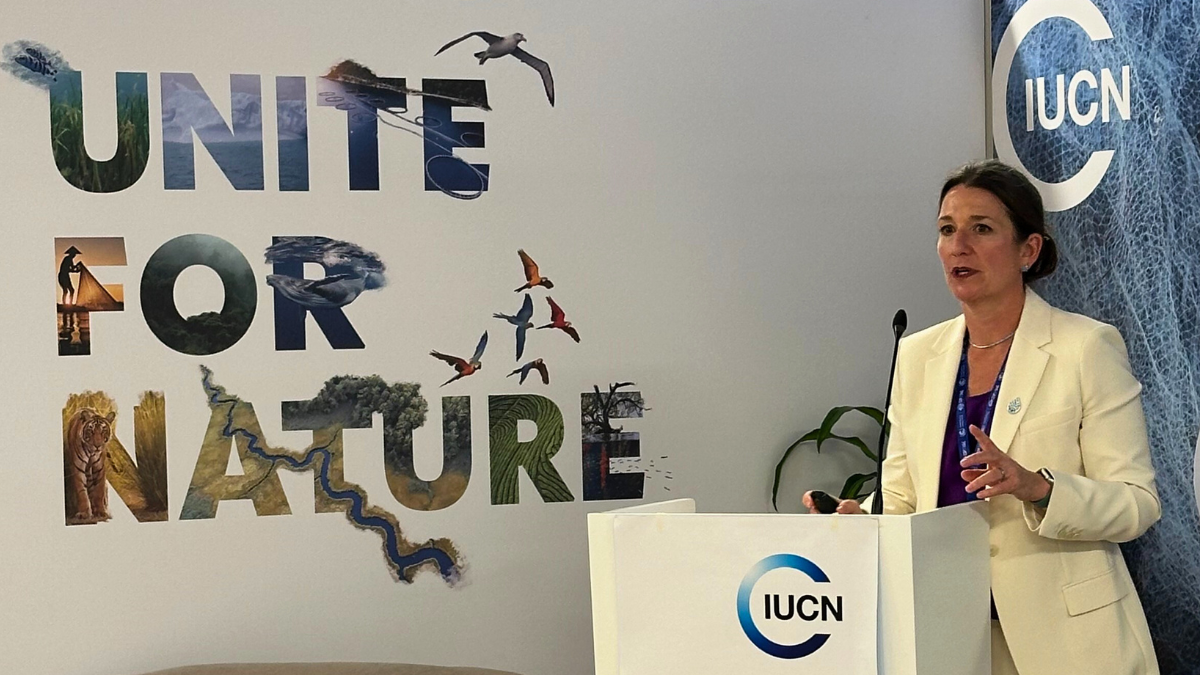
Professor Young gave opening remarks introducing the relationship between extreme climate events, water insecurity and food insecurity.
“How does water insecurity relate to extreme climate events? ... If you are water insecure—if you’re having problems with water access and use—you’re between two and three times as likely to be food insecure. In other words, if you care about food insecurity, you have to care about water insecurity,” said Professor Sera Young, who co-leads Northwestern Buffett’s Making Water Insecurity Visible Global Working Group, during the research presentation "If climate change is a shark, water is its teeth: How water insecurity data can mobilize action" at the International Union for the Conservation of Nature’s pavilion, which she organized with the support of the Northwestern Trienens Institute for Sustainability and Energy. At the event, she and co-presenters revealed the first-ever picture of how water insecurity experiences covary with climate events.
“We used the International Disaster Database, which tracks extreme weather events, defined as affecting more than 100 people or lasting more than a month...26 percent of the people had experienced floods for more than a month in the last year, and you can see the odds of water insecurity are higher if you have experienced floods. Same for storms and same for droughts. What that tells us is that both too much water and too little water are associated with major problems with water access and use...but if we’re not measuring water insecurity at the individual level, we don’t know who’s being left behind.”
Sapna Ramesh
PhD Candidate, Department of Chemical and Biological Engineering, McCormick School of Engineering
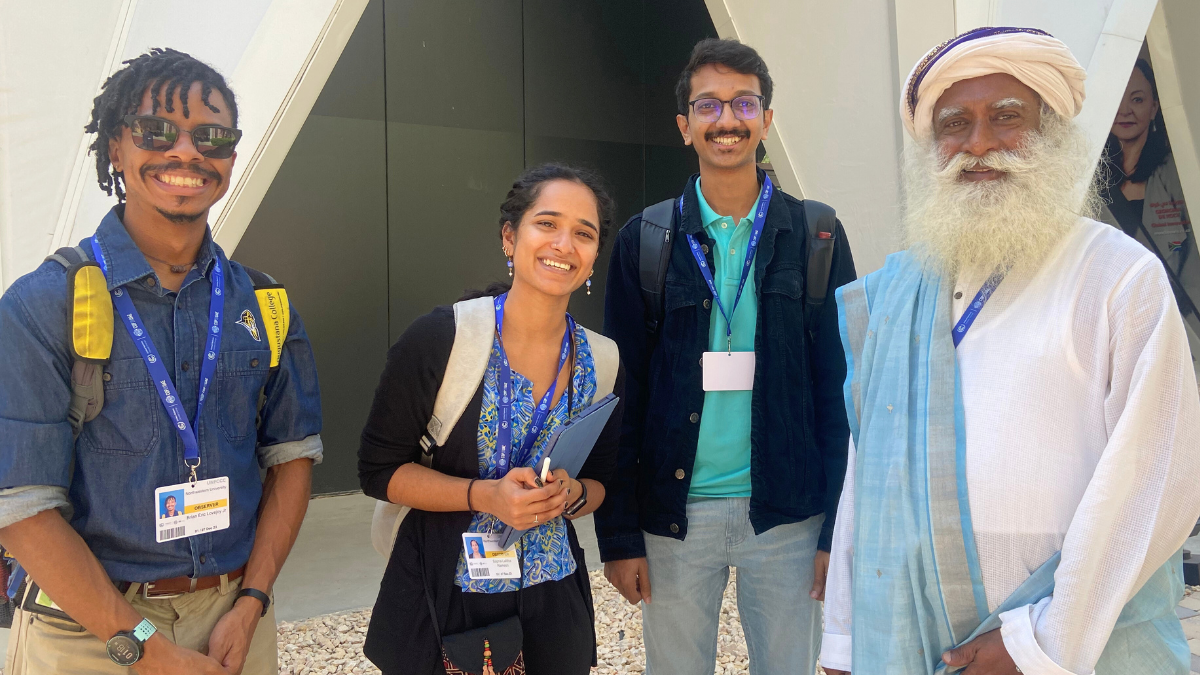
(from left to right) Brian E. Lovejoy, Jr., Sapna Ramesh, Aman Shaikh and Sadhguru, founder of Isha Yoga and Conscious Planet
“As a scientist and an engineer, it was cool to see how this edition of artificial intelligence can make our work even more sustainable and impactful. I attended an event on artificial intelligence and how it can be applied to renewable energy deployment around the world. They discussed how artificial intelligence is spurring the fourth industrial revolution and explored its innovative applications related to climate change, which was really exciting for me,” said Sapna Ramesh, whose research focuses on investigating electrolyte reduction mechanisms in lithium metal batteries to engineer more sustainable, safe and efficient energy storage systems.
“The impacts of climate change are already being felt seriously and devastatingly by so many people, and we don't need any more science to tell us that. Talking about deploying these new technologies and hearing from people feeling the impacts of climate change now—the urgency of that was interesting for me. It exemplifies the different people that are giving a voice at COP and the wide variety of perspectives that you can hear from.”
Aman Shaikh
Graduate Student, Master of Engineering Management Program, McCormick School of Engineering
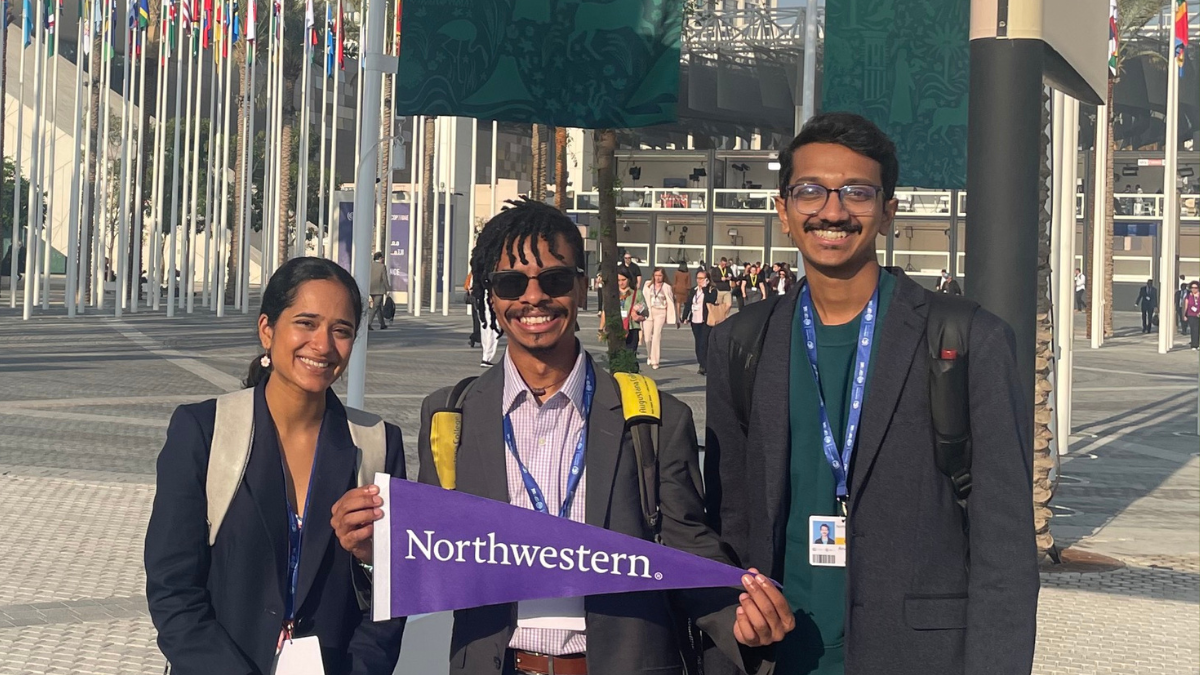
(from left to right) Sapna Ramesh, Brian E. Lovejoy, Jr. and Aman Shaikh
“Each day at COP28 was a chapter of learning and understanding—of seeing the climate crisis through multiple lenses and comprehending the varied strategies needed to address it. For me, the significance of COP28 is its ability to convene over 80,000 people from around the globe, fostering dialogue on climate action, even if just for two weeks a year. This gathering in itself symbolized a collective effort worth acknowledging,” wrote Aman Shaikh in a recent blog post reflecting on his experiences. He immersed himself in the intersection of technology and climate change mitigation at COP28 in addition to deepening his understanding of climate finance and the crucial need for a socially just transition to carbon neutral policies and technologies across the globe.
“One of the highlights was listening to notable figures like Bill Gates, Hillary Clinton and Al Gore. Their discussions spanned a range of pertinent topics, from the practicality and necessity of direct air carbon capture to the nuanced ways in which climate change intertwines with issues of gender inequality. Their insights added depth to the narrative of the summit, offering perspectives that were as diverse as they were profound. Each day at COP28 was a chapter of learning and understanding, of seeing the climate crisis through multiple lenses and comprehending the varied strategies needed to address it.” Read Shaikh's blog post >>
